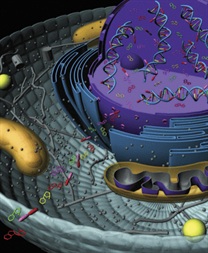Sabotage as therapy: aiming lupus antibodies at vulnerable cancer cells

Photo credit: Image by www.christianchang.com
The findings were published recently in Nature’s journal Scientific Reports.
The study, led by James E. Hansen, M.D., assistant professor of therapeutic radiology at Yale School of Medicine, found that cancer cells with deficient DNA repair mechanisms (or the inability to repair their own genetic damage) were significantly more vulnerable to attack by lupus antibodies.
“Patients with lupus make a wide range of autoantibodies that attack their own cells and contribute to the signs and symptoms associated with lupus. Some of these antibodies actually penetrate into cell nuclei and damage DNA, and we suspected that we may be able to harness the power of these antibodies for use in targeted cancer therapy,” Hansen said.
The genetic code that determines how a cell develops is written in DNA. Damage to this code can cause a cell to malfunction, die, or transform into a cancer cell. Normal cells are equipped to repair damaged DNA and preserve the genetic code, but many cancer cells have defective DNA repair machinery and accumulate genetic mutations.
This difference between normal cells and certain cancer cells creates an opportunity to develop therapies that damage DNA and only kill cancer cells that cannot repair the damage. However, DNA is sequestered inside cell nuclei, where delivery of therapies can be challenging. Yale Cancer Center researchers are finding that naturally occurring lupus antibodies just may be a solution to this problem.
“Lupus antibody-based cancer therapy is an emerging new concept, and I believe we are just seeing the tip of the iceberg in terms of the potential of this approach,” said Hansen.
The researchers previously found that a lupus antibody called 3E10 inhibits DNA repair and sensitizes cancer cells to DNA damage, and they have now found that the DNA-damaging lupus antibody 5C6 is toxic to DNA repair-deficient cancer cells.
“Now that we know that more than one lupus antibody has a selective effect on cancer cells, I am confident that additional lupus autoantibodies with even greater therapeutic potential await discovery,” Hansen said.
This work was supported in part by an American Cancer Society Institutional Research Grant.
Citation: Scientific Reports http://www.nature.com/srep/2014/140805/srep05958/full/srep05958.html
Media Contact
More Information:
http://www.yalecancercenter.org/news/article.aspx?id=7907All latest news from the category: Life Sciences and Chemistry
Articles and reports from the Life Sciences and chemistry area deal with applied and basic research into modern biology, chemistry and human medicine.
Valuable information can be found on a range of life sciences fields including bacteriology, biochemistry, bionics, bioinformatics, biophysics, biotechnology, genetics, geobotany, human biology, marine biology, microbiology, molecular biology, cellular biology, zoology, bioinorganic chemistry, microchemistry and environmental chemistry.
Newest articles

Bringing bio-inspired robots to life
Nebraska researcher Eric Markvicka gets NSF CAREER Award to pursue manufacture of novel materials for soft robotics and stretchable electronics. Engineers are increasingly eager to develop robots that mimic the…

Bella moths use poison to attract mates
Scientists are closer to finding out how. Pyrrolizidine alkaloids are as bitter and toxic as they are hard to pronounce. They’re produced by several different types of plants and are…

AI tool creates ‘synthetic’ images of cells
…for enhanced microscopy analysis. Observing individual cells through microscopes can reveal a range of important cell biological phenomena that frequently play a role in human diseases, but the process of…





















